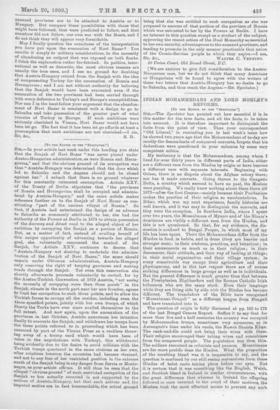[To THE EDITOR OW THE "SPECTATOR."] SIR,—In your article last
week under this heading you state that the Sanjak of Novi Bazar "was never placed under Austro-Huugarian administration, as were Bosnia and Herze- govina," and that the obvious ground of its occupation was that "Austria-Hungary was determined that the door which led to Salonika and the Aegean should not be closed against her." I submit that there is no ground whatever for this constantly reiterated assumption. Article XXV. of the Treaty of Berlin stipulates that "the provinces of Bosnia and Herzegovina shall be occupied and adminis- tered by Austria-Hungary," and the same article makes reference further on to the Sanjak of Novi Bazar as con- stituting "part of the ancient vilayet of Bosnia." So that, if Austria had entertained the design of an advance to Salonika so commonly attributed to her, she had the authority of the Powers at Berlin in 1878 to obtain possession of the doorway and direct road to the alleged object of her ambition by occupying the Sanjak as a portion of Bosnia. But, as a matter of fact, instead of availing herself of this unique opportunity of advancing towards her alleged goal, she voluntarily renounced the control of the Sanjak, for Article XXV. continues to decree that "Austria-Hungary not desiring to undertake the adminis- tration of the Sanjak of Novi Bazar," the same should remain under Ottoman administration, Austria-Hungary only reserving the right of keeping garrisons and making roads through the Sanjak. Yet even this reservation she shortly afterwards proceeds voluntarily to curtail, for by the Auetro-Turkish Convention of 1879 Austria, ".not seeing the necessity of occupying more than three points" in the Sanjak, situate in the north part near her new frontier, agrees to limit her occupation to such three points, and to allow the Turkish forces to occupy all the residue, including even the three specified points, jointly with her own troops, of which liberty the Turks have ever since availed themselves to the full extent. And now again, upon the annexation of the Provinces in last October, Austria announces her intention finally to evacuate the Sanjak, and withdraws her troops from the three points referred to (a proceeding which has been censured by part of the Vienna Press as a reckless throw- ing away of a trump card which would have been of value in the negotiations with Turkey), this withdrawal being evidently due to the desire to avoid collision with the Turkish troops quartered in the same stations as her own, after relations between the countries had become strained, and not to any fear of her restricted position in the extreme north of the Sanjak being in any danger from Servia or Monte- negro, as your article affirms. It will thus be seen that the alleged "obvious ground" of such restricted occupation of the Sanjak as has actually occurred is not supported by the actions of Austria-Hungary, but that such actions and the imputed motive are in fact irreconcilable, the gaud gronnd
being that she was entitled to such occupation as she was prepared to assume of that portion of the province of Bosnia which was entrusted to her by the Powers at Berlin. I have no interest in this question except as a student of the subject, approving the recent action of the Dual Monarchy as essential to her own security, advantageous to the annexed provinces, and tending to promote in the only manner practicable that union of the Croato-Servitin people to which they aspire.—I am,
[We are anxious to give full consideration to the Austro- Hungarian case, but we do not think that many Austrians or Hungarians will be found to agree with the writers of these two letters that Austria-Hungary has no desire to go to Salonika, and thus reach the Aegean.—ED. Spectator.]










































 Previous page
Previous page